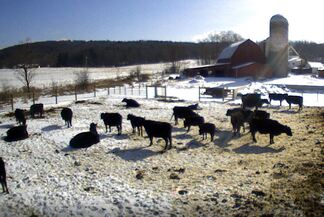CONSERVATION CORNER
A weekly blog for all things conservation
 By: Nathan Dewing, Agricultural Team Leader Conditions get tough for managing livestock in the winter. It can be stressful for animals, farmers, and our natural resources. Let’s consider steps to dramatically decrease cold snap stress. If a farmer can cut the wind and give his animals a solid place to land their feet, our winter temps will cause little stress. If relatively dry with a barrier against bitter wind, our animals like 15 degrees F, better than 90 degrees. Start by looking for or creating a “high and dry” area for the animals. This means there will be very little surface runoff flowing into the place where livestock are kept. Runoff could come from up-slope areas or surrounding building roofs. If a location does have significant watershed sending storm-water runoff through, consider a simple diversion above the livestock area. The conservation district can help size a diversion channel that can carry water safely without causing erosion. If near-by roofs contribute water, gutters or in-ground drains under the eaves can dramatically improve livestock holding areas.
The next consideration is manure handling. Try to develop a surface that allows regular manure collection. Of course, concrete could do the job, but other surfaces like compacted stone can do nicely. Being able to collect it routinely goes a long way toward keeping animals clean and dry. This manure is also a valuable resource, and efficient utilization plays a big part in farm profitability. The nutrients and organic matter in that manure are doing no good piling up in a barnyard or flowing down the creek, while crop fields are starving for them. Manure collected in the winter can be responsibly spread on the farm fields, but ideally can be properly stored for application in the spring when plants are ready to use the nutrients. Pennsylvanians have established regulations for acceptable winter manure spreading, which basically boil down to light application rates far from water, while avoiding steeper fields and fields with bare soil. They also provide acceptable ways to pile manure in order to store it for spreading later in the spring. Anyone can access these details from our web page www.bccdpa.com/agriculture or by contacting the conservation district. Cutting the wind is an important step in managing winter livestock stress. It might be simpler than you think, however. It doesn’t mean requiring a fully enclosed barn. In wide open spaces, a porous wall provides better protection than a solid wall. When wind hits a solid wall, it climbs up one side and right down the other. When it hits a porous wall, it dissipates. The best windbreak is 25% - 30% porous. For example, if using 6” wide boards, place them with 2” gaps between. A porous windbreak will create a down-wind protected zone extending 8-10 times the height of the break. A 5’ tall, porous windbreak will provide 40’-50’ of down-wind relief. Wind break construction possibilities are limited only by one’s creativity. In these conditions cattle and other livestock can thrive all winter, even with no roof over their head. Farmers can see feed and labor efficiencies and breathe a sigh of relief knowing that their livestock are set-up to produce all winter long. These steps will relieve stress on natural resources at the same time. Think of it this way – do everything possible to keep clean water clean, and when water does get dirty, get it into the soil before it runs off. Conditions will get tough this winter. A little preparation will make a big difference – for everyone! The Bradford County Conservation District is committed to helping people manage resources wisely. You can visit the Bradford County Conservation District at 200 Lake Rd in Wysox across from the Wysox Fire Hall. Contact us at (570) 485-3144 or visit our web page at www.bccdpa.com.
0 Comments
Leave a Reply. |
AuthorsVarious staff at the Bradford County Conservation District Archives
July 2024
Categories
All
|
|
Bradford County Conservation District
Stoll Natural Resource Center 200 Lake Road, Suite E | Towanda PA 18848 Phone: (570)-485-3144 |
